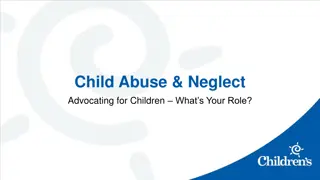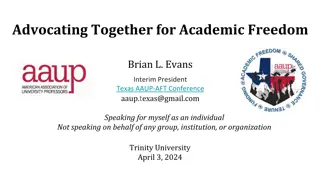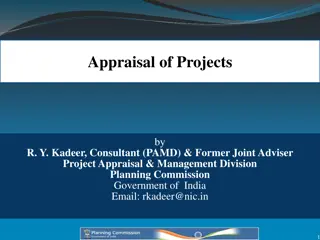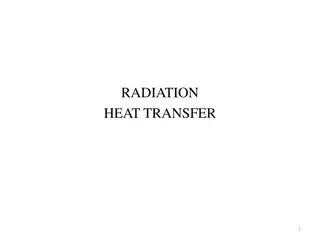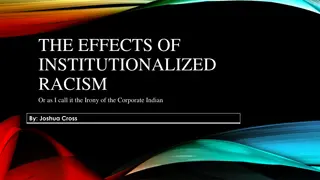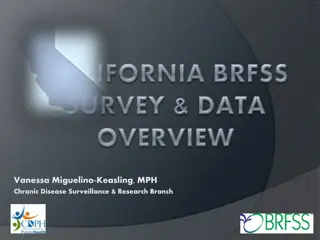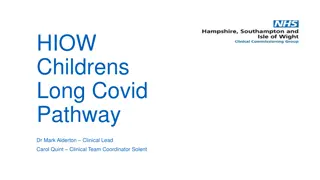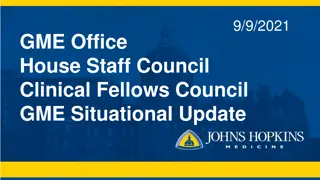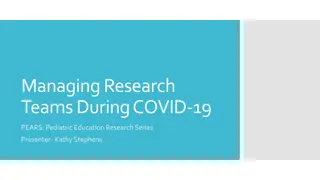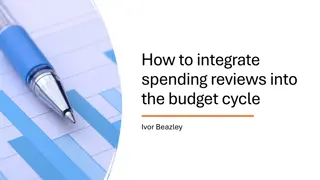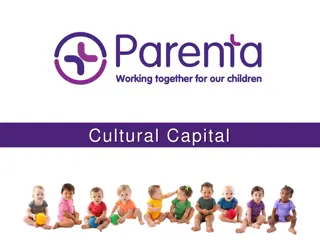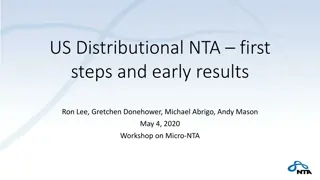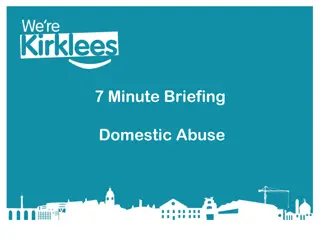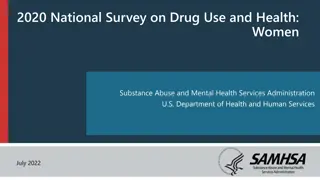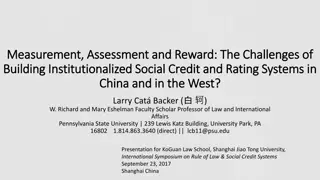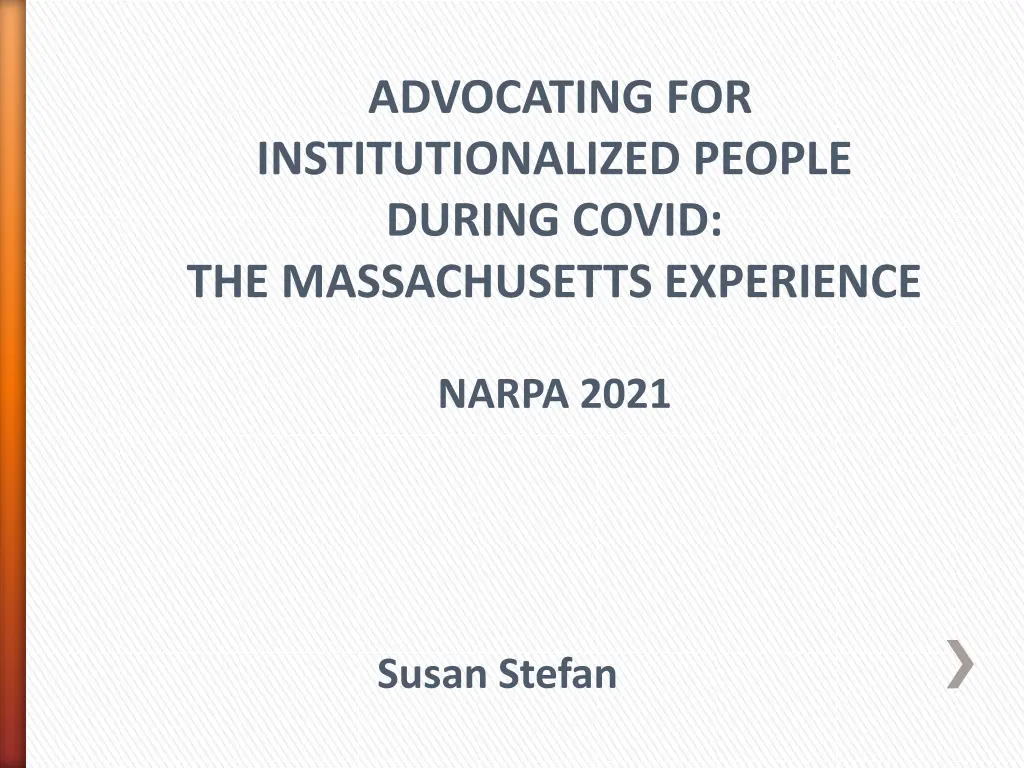
Advocating for Institutionalized People During COVID: Massachusetts Experience
Explore how disability rights organizations in Massachusetts worked together proactively to address issues faced by institutionalized individuals during the pandemic. Key topics include emergency issues, organizational efforts, and advocacy strategies. Learn about the challenges faced by people in congregate facilities and the triage issues relating to explicit disability-based discrimination in emergency plans.
Download Presentation

Please find below an Image/Link to download the presentation.
The content on the website is provided AS IS for your information and personal use only. It may not be sold, licensed, or shared on other websites without obtaining consent from the author. If you encounter any issues during the download, it is possible that the publisher has removed the file from their server.
You are allowed to download the files provided on this website for personal or commercial use, subject to the condition that they are used lawfully. All files are the property of their respective owners.
The content on the website is provided AS IS for your information and personal use only. It may not be sold, licensed, or shared on other websites without obtaining consent from the author.
E N D
Presentation Transcript
ADVOCATING FOR INSTITUTIONALIZED PEOPLE DURING COVID: THE MASSACHUSETTS EXPERIENCE NARPA 2021 Susan Stefan
Disability Rights Infrastructure Existing disability rights organizations who rapidly and cooperatively work with each other and who --Recognize Emerging Disability Rights Issues in Emergencies --Are Proactive, not Reactive --Act Immediately
FOUR EMERGENCY ISSUES IN PANDEMIC 1. People in Congregate Facilities, Jails and Prisons at Greatly Elevated Risk of COVID 2. Consequences of Lockdown 3. Overstrained Hospitals and ICUs Were Developing Triage Standards for Rationing Care 4. Hospitals Were Denying Visitation/Accompaniment
Massachusetts Organizations CPCS: public defender/MHLD DLC: Mass. Protection & Advocacy MHLAC: state MH rights agency CPR: systemic advocacy people with psych/intellectual disabilities & brain injuries RLCs: Grassroots peer support/advocacy organizations
People in Congregate Facilities at Greatly Elevated Risk of COVID 1. CPCS: 2. DLC: investigated Tewksbury State Recommendations to better protect patients 3. MHLAC a. Brought litigation against DMH over state hospitals with high infection and death rates a. Discharge non-violent, at-risk people b. Add new element to commitment
People in Congregate Facilities at Greatly Elevated Risk of COVID 4. RLCs: Provided Reliable Information to Members About COVID Provided Alternative Services Provided Advocates with Reliable Information about Hospital Conditions and Sources of Vaccine Hesitancy Protest over Hospital Conditions at the Shattuck
TRIAGE ISSUES: TRIAGE ISSUES: EXPLICIT DISABILITY-BASED DISCRIMINATION IN EMERGENCY PLANS Alabama: Guidance for ventilator triage in emergency situations precludes ventilators for people with severe or profound retardation, moderate or severe dementia, and severe traumatic brain injury, including children. Tennessee: excluding people with spinal muscular atrophy who need assistance with ADLs from critical care
TRIAGE ISSUES TRIAGE ISSUES New York: People with disabilities who used ventilators because of chronic disabilities faced possible loss of those ventilators Massachusetts: Guidelines changed from long-term survival to short-term survival Washington: Guidance to transfer people with loss of reserves in energy, physical ability, cognition and general health to outpatient or palliative care.
Timeline March 10: Governor Baker declares pandemic emergency March 12: Visitation restricted at nursing homes March 19: Visitors restricted from state psych and other health care facilities March 21: first COVID-positive prisoner March 23: CPR files Triage complaint (Wash.) March 24: CPR files Triage complaint (Ala.) March 25: CPCS v. Chief Judge filed
Timeline March 26: CPR DLC MHLAC letter to Baker suggesting triage guidelines to prevent disability discrimination March 27: CPR files complaint re Kansas Toolkit for COVID-19 March 28: HHS OCR Triage policy issued March 31: Oral argument CPCS v. Chief Judge April 3: SJC orders non-violent pretrial detainees entitled to rebuttable presumption of release
Timeline April 16: Joint letter from DLC and MHLAC about conditions at Shattuck Hospital April 16: 67 pts and 46 staff test positive at Tewksbury Hospital April 21: first psych pt dies of COVID at Shattuck Hospital April 23: DLC initiates investigation of COVID at Tewksbury May 7: Foster complaint filed May 7: SAMHSA Consideration for Care & Tx of Substance Abuse & Mental Disorders in the COVID-19 Epidemic
Timeline May 7: SAMHSA Consideration for Care & Tx of Substance Abuse & Mental Disorders in the COVID-19 Epidemic May 17: MASSAct protests at Shattuck Hospital June 2: Foster decision adding extra elements to civil commitments July 31, 2020: MHLAC sues Mass. DMH over Tewksbury conditions
Other States Were Doing Other States Were Doing This Too This Too Alabama: P&A complained about discriminatory triage standards California: P&A sues Patton State Hospital, August 2020 Connecticut: CLRP on April 20 writes Conn. Gov. asking for ban on psych hospital admissions/expedited d/c Michigan: Chief Justice tells judges to release more people on their own recognizance and use more probation and tx programs as alternatives
Other States Were Doing Other States Were Doing This Too This Too New Jersey: Office of Public Defender secures consent decree that suspends or commutes low-risk inmates South Carolina: All non-capital defendants shall be released on recognizance without surety unless unreasonable danger to community or extreme flight risk.
Foster v. Commissioner Foster v. Commissioner of Dept. Corrections ( of Dept. Corrections (Foster 1) Foster 1) 1. About prisoners/people committed for substance abuse (Sec. 35), but language made clear it was applicable to m.h. commitments. 2. COVID affects whether commitment is narrowly tailored to meet gov t interests in safety and treatment. 3. Therefore, for the duration of the pandemic, the Supreme Judicial Court adds an element to the criteria for commitment:
Foster v. Commissioner Foster v. Commissioner of Dept. Of Corrections ( of Dept. Of Corrections (Foster 1) Foster 1) 3(a) No commitment unless the danger posed by the individual's substance use disorder outweighs the risk of transmission of COVID-19 in congregate settings. 3(b) Additionally, commitment must be necessary notwithstanding the treatment limitations imposed by quarantine protocols.
IMPLEMENTATION OF THESE VICTORIES IN MASSACHUSETTS 1. 1. SJC ORDER TO DISCHARGE NON SJC ORDER TO DISCHARGE NON- - DANGEROUS PEOPLE DANGEROUS PEOPLE met with resistance by District Court Judges and DAs. 2. 2. TRIAGE VICTORIES LESS MEANINGFUL TRIAGE VICTORIES LESS MEANINGFUL if people with disabilities were unaccompanied or as applied to scarce resources such as ECMOs that were limited for non-disabled people as well
LESSONS LEARNED FOR THE NEXT TIME 1. 1. Get your disability rights infrastructure Get your disability rights infrastructure in place, and working together in place, and working together SPECIFICALLY: a. civil commitments should be defended by an entity staffed by people who focus on this: Mass. model, NY model, Miami Fl model, D.C. model, Minn. model b. P&As should work regularly with ACLU, Legal Services, Public Defenders, etc.
Lessons learned for the next time (cont.) 2. Make sure you know your state s triage Guidelines and fix discriminatory provisions before the next pandemic 3. District Attorney is an office that disability Rights advocates should pay more attention to, both in terms of education and election support --same with lowest level judges
What needs to be done right now Many civil rights were relaxed in light of the pandemic and society is only too willing to continue these practices: *Zoom Commitment Hearings *In-home Therapy for Disabled Kids Goal: a world where decisionmakers automatically think about people with disabilities when making policies
QUESTIONS OR COMMENTS? FABULOUS CARTOONS BY JOHN CALLAHAN

